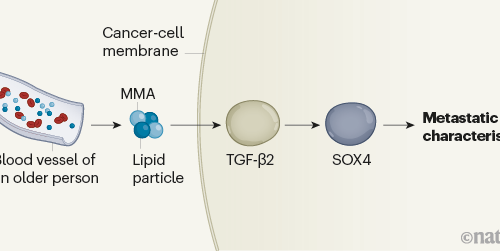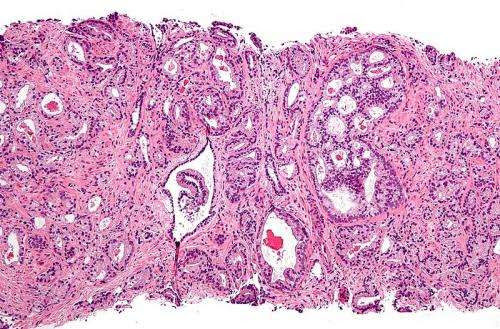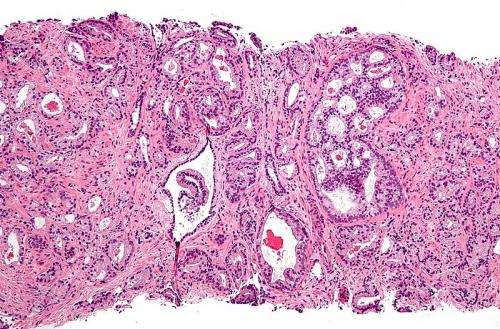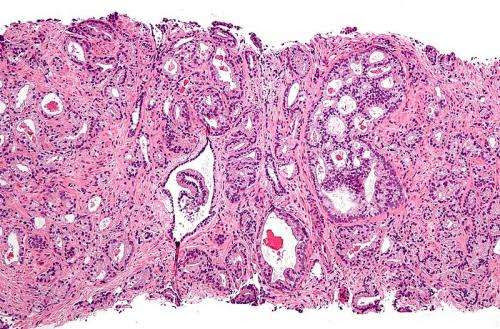by Georgia Institute of Technology Fabrication of the microchip. The device is fabricated by injecting a polymer into a micro fabricated mold and the polymer is cured under ultraviolet light to produce low-cost, single-use devices. Credit: Georgia Institute of Technology Researchers at the Georgia Institute of Technology have found a detection method that could revolutionize...
Tag: <span>metastatic</span>
Coffee associated with improved survival in metastatic colorectal cancer patients
DANA-FARBER CANCER INSTITUTE BOSTON – In a large group of patients with metastatic colorectal cancer, consumption of a few cups of coffee a day was associated with longer survival and a lower risk of the cancer worsening, researchers at Dana-Farber Cancer Institute and other organizations report in a new study. The findings, based on data...
Molecules in the blood of older people promote cancer spread
A molecule produced by the metabolism of proteins and fats has been found to accumulate in the blood of older people, and to endow cancer cells with the ability to spread from one site in the body to others. As we get older, the risk that we will develop cancer increases, because we accumulate genetic...
PARP inhibitor becomes new treatment option for some men with advanced prostate cancer
by University of Chicago Medical Center Results from an international clinical trial found that men with advanced prostate cancer who have mutated BRCA1/BRCA2 genes can be treated successfully with a targeted therapy known as rucaparib, resulting in recent FDA approval. Prostate cancer is the most common cancer and the second leading cause of cancer death...
Promising new treatment of advanced skin cancer
A new type of immunotherapy for the skin cancer malignant melanoma shows promising results. Three severely ill patients are now long-term survivors. The study, published in OncoImmunology, is the result of a collaboration between researchers at Karolinska Institutet and Karolinska University Hospital. “Immunotherapy is based on activation of the body’s own immune defense to eliminate...
Researchers Optimistic After Dose-Determining Trial of Compound Against Metastatic Castration-Resistant Prostate Cancer
This news or article is intended for readers with certain scientific or professional knowledge in the field. A new multi-institution, dose-determining clinical trial of a compound against metastatic, castration-resistant prostate cancer showed promising results, researchers reported in Clinical Cancer Research. The phase 1b/2a study of the pan-BET bromodomain inhibitor ZEN-3694 in combination with enzalutamide was...
New Clues in Resistance to Mainstay Drug for Patients with Metastatic Prostate Cancer
This news or article is intended for readers with certain scientific or professional knowledge in the field. Enzalutamide is one of the main treatments for patients with metastatic, castration-resistant prostate cancer — the lethal form of the disease. However, treatment options are limited for those who develop resistance to enzalutamide. Now, a multi-institution team has...
Researchers identify possible drug target for prostate cancer
by Boston University School of Medicine Researchers from Boston University School of Medicine (BUSM) have discovered that the protein BRD4 could be an important new target to prevent castration-resistant prostate cancer metastases. Castration-resistant prostate cancer is a highly aggressive form of prostate cancer that often leads to the development of lethal metastases that kills more...
Prostate cancer metastasis linked to revival of dormant molecular program
by Dana-Farber Cancer Institute When prostate cancer progresses to a more-dangerous metastatic state, it does so by resurrecting dormant molecular mechanisms that had guided the fetal development of the prostate gland but had been subsequently switched off, say scientists from Dana-Farber Cancer Institute. The study, an international collaboration with The Netherlands Cancer Institute, was published...
A different Chia-PET provides insight into prostate cancer
by UT Southwestern Medical Center This graphic illustrates three-dimensional genome organization maps obtained form a representative metastatic cancer cell line. Credit: UT Southwestern Medical Center UT Southwestern researchers have identified vast webs of small snippets of the genome that interact with each other and with genes to promote prostate cancer. Their findings, published June 22...
- 1
- 2








